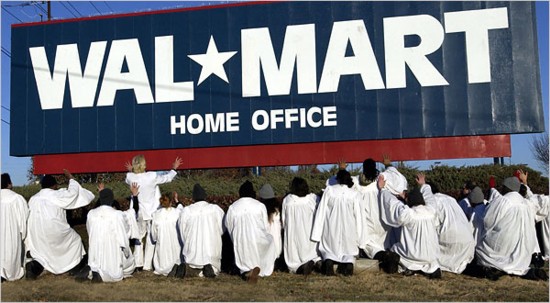FILM-FORWARD.COMReviews of Recent Independent, Foreign, & Documentary Films in Theaters and DVD/Home Video
Directed by Rob VanAlkemade Produced by Peter Hutchinson, Stacey Offman, Morgan Spurlock Music by William Moses Directors of Photography, Alan Deutsch, Daniel Marracino, Martin Palafox, Alex Stikich, & Rob VanAlkemade Edited by Gavin Coleman & Stela Georgieva Released by Arts Alliance America USA. 91 min. Rated PG Special Features: Deleted scenes (15 min.). Trailer. Christmas carol lyrics Anti-consumerism messages abound in a society where over-consumption is the norm, but rarely does an act of activism feel as unique or passionate as the message of Reverend Billy and the Stop Shopping Gospel Choir. In the opening frames of the documentary, Reverend Billy is seen on CNN being asked, “What is it that you are trying to tell people.” He appears in his white suit, with his slicked-back bleached blond hair, his hands flailing, declaring “We are trying to get them to slow down their consumption…. We’re addicted, and we’re conflicted, we’re hypnotized, and consumerized.” Reverend Billy (not actually a minister) has created this persona that is equal parts activist, performance artist, and comedian. The film follows him and his choir on their Shopocalypse Tour as they preach in streets, shopping malls, Disney stores, and Starbucks (except in Texas, where he is no longer allowed to enter a Starbucks). He chants, gyrates, and screams the perils of materialism, while his gospel choir sings revised hymns and Christmas carols focusing on the problematic relationship between overspending on gifts and the meaning of Christmas. The film jointly gains its power from Reverend Billy’s sermons and great anecdotes, like his story of a man who was shot in the chest while attempting to buy the new and highly-sought PlayStation 3. While coughing up blood, the man asked the clerks to take his wallet and buy the PlayStation for him. You can’t make up stories like this. But the film takes it’s time, allowing the intricacies of his mission to surface. The opening sequences are shrouded in abstract notions of anti-consumerism sentiment, making it feel as though the reverend and his choir don’t necessarily have a goal. This, of course, is not true, but it takes the filmmakers until the one-hour point to really get into the meat of his mission when we see Reverend Billy speaking to a small business owner about the damaging effect big box stores are wreaking for mom and pop businesses. It is obvious that their mantra, “Stop Shopping,” is something of a hyperbole, emblematic of the tongue-in-cheek nature of the undertaking. Their true goals – in short, shopping less and shopping smartly – are not revealed until far too late into the film. The inherent irony of the need to gas up the tour bus and to purchase other goods along the way is not lost on the filmmakers, or Reverend Billy, but is never truly explored. But for the bulk of the film, the 2005 road trip is easy and fun, though not entirely successful. At one point, Reverend Billy and his wife fall onto their hotel beds after an anti-climatic visit to Wall-Mart corporate headquarters. “Boy, that was miserable,” says Billy staring at the ceiling. This is a moment where the obstacles of such fervent activism are revealed, but so little is actually shown. Seeing how the group handles the difficult moments – when they think they aren’t having any impact or when their bus crashes with a semi – make the film, revealing that their mission is as complicated as you’d imagine. But not enough time is given for fulfilling the curiosity these difficulties bring about. The filmmakers, instead, focus on man-on-the-street interviews with shoppers, which do carry significance, but are given too much time and often verge on mocking the interviewees’ cluelessness.
Nonetheless, the film is at its best when Reverend Billy is shown speaking to people, all feeling mutually empowered, or when it
focuses on the average person who embraces his message. Its one weakness is that it just isn’t long enough to satisfy the many questions it raises.
Dustin L. Nelson
|
